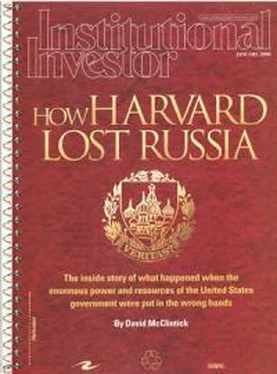He also met with Aldrich, who called Hay to his office and directed him to a chair so they could face each other.
"Jonathan, I absolutely need to know the truth," Aldrich said, according to his deposition in the U.S. lawsuit.
Hay proclaimed his innocence, furious that he had been "summarily dismissed . . . and . . . prejudicially judged."
"Jonathan, did you or did you not invest in Russian securities?"
"No." Hay looked uncomfortable.
"Is that your truthful answer?"
"Well, I invested for my father. It wasn't much."
"What are we talking about here? How much money was it?"
"Well, $50,000."
"There's nothing else that these people can catch you on, hang you on?"
"Nothing else."
Aldrich wasn't convinced. "Jonathan, this is really important to me. I'm a fiduciary here. I've got money I'm responsible for. Is there anything else that you did that is wrong? Is there something else I should know about?"
"No, no, that's it."
"You're telling me that your father's investment of $50,000 was something that you were perfectly within your rights to do?"
"Yes. I didn't do anything wrong."
On May 30, Chubais and Vasiliev complained directly to Summers at Treasury "with considerable vigor and bitterness," Summers later recalled in his deposition. "They felt the U.S. government's refusal to fund the HIID project . . . constituted a significant interference with their objective of bringing about market and democratic institutions in Russia and seemed to them to be a kind of unconstructive and hostile act by the United States government."
Several days later Zimmerman received a call at home from Leonard Blavatnik, the Forbes 400 billionaire who had arranged the Shleifers' first investment in Russian stocks, back in 1994. Blavatnik was concerned about the public controversy surrounding the Harvard Russia Project.
"It's a witch hunt," Zimmerman said. "A political vendetta."
Blavatnik promptly prepared a backdated document changing the beneficial ownership of the stock purchased in 1994 from Shleifer to Zimmerman. The Shleifers' $200,000 investment through the Blavatnik vehicle Renova at one time had tripled in value -- the Gazprom component had been up fivefold.
The collapse of the Harvard project had an immediate and negative consequence for the Russian reformers with which it was connected. On Friday, May 30, 1997, barely more than a week after first deputy prime minister Chubais pulled the plug on the Harvard project, he summoned Vasiliev to the Kremlin and resolved his conflict with the Central Bank. The Central Bank would be given the right to license commercial banks to trade in the equity market -- in effect opening the door to the German model of heavy bank investment in the stock market, which Vasiliev had opposed so bitterly for so long. Vasiliev resigned in October 1999, citing personal reasons.
By then Harvard had put HIID out of its misery, replacing it with the Center for International Development. Sachs, who stayed around for the launch of the CID, eventually left Harvard for Columbia.
Also by that time, Pallada had been bought by State Street Global Advisors and Farallon Capital had decided to dissolve its joint venture with Zimmerman. In late 1998, according to sources at Farallon, the San Francisco firm gave back to her its passive minority stake on the condition that she change the name of her firm from Farallon Fixed Income Associates; she renamed it Bracebridge Capital. Public records show that in 2001 she also began to use the acronym FFIA for her business; she continued to do so into 2004, when Farallon discovered its use and protested.
WHEN AN AGENCY OF THE U.S. government determines that crimes have been committed, it prepares a "criminal referral" to the Department of Justice, which evaluates the case and decides whether to prosecute. AID made its referral in June 1997. The Justice Department approved the case and assigned it to the U.S. Attorney's Office in Boston and the FBI. On July 10 a meeting of FBI agents and federal prosecutors was convened at the Boston federal courthouse by Assistant U.S. Attorneys Sara Miron Bloom and Stephen Huggard.
Bloom and Huggard gathered evidence for a year and presented witnesses and documents to a federal grand jury for two additional years. Though they wanted a criminal prosecution, the government, in the end, filed civil charges only.
On September 26, 2000, the U.S. government sued Harvard University, Andrei Shleifer, Jonathan Hay, Nancy Zimmerman and Elizabeth Hebert on 11 counts, including fraud, breach of contract and making false claims to the federal government. The suit estimated that the government had been defrauded of at least $40 million and asked treble damages under the False Claims Act.
One month later Forum Financial Group and John Keffer sued Harvard, Shleifer and Hay for fraudulent misrepresentation and other alleged infractions and asked unquantified actual and punitive damages. The defendants denied the alleged wrongdoing in both suits.
On November 12, 2001, U.S. District Court Judge Douglas Woodlock dismissed the charges against Zimmerman and Hebert on the grounds that the government essentially had failed to allege a sufficient number of relevant facts against them. However, he left open the possibility that the government could refile the charges under certain circumstances.
After extensive discovery, including about 60 depositions and the collection of more than 1,000 documentary exhibits, the government and the defendants all moved for summary judgment in their favor. Shleifer insisted he was a "consultant" rather than an employee, was never "assigned" to Russia and was therefore exempt from conflict-of-interest regulations. A key question for the judge was whether Shleifer or Hay had violated the "regulations governing employees."
On June 28, 2004, Judge Woodlock ruled against Shleifer and Hay. He wrote, "I find that the Cooperative Agreements were valid contracts between Harvard and USAID, that they created an obligation to remain free of conflicts of interest, and that actions by Hay and Shleifer breached that duty.
"Shleifer was in charge of the entire Russian Project, and classifying him as a consultant would result in the anomalous circumstance that the head of the project was exempt from the conflicts of interest regulations. . . . I find no genuine dispute of material fact as to Shleifer's status as an employee of HIID."
The judge determined that Shleifer and Hay were subject to the conflict-of-interest rules and had tried to circumvent them; that Shleifer engaged in apparent self-dealing; that Hay attempted to "launder" $400,000 through his father and girlfriend; that Hay knew the claims he caused to be submitted to AID were false; and that Shleifer and Hay conspired to defraud the U.S. government by submitting false claims.
On July 30, 2004, the government announced that Zimmerman had settled with the U.S. Even though the charges against her personally had been dismissed, the U.S. said that her firm had "improperly diverted U.S. taxpayer resources for its own purposes and profit" in AID's Russia program between 1992 and 1997. Zimmerman's firm had to pay $1.5 million to the U.S. government.
That December, Judge Woodlock conducted a jury trial to settle the factual question of whether Shleifer was "assigned to" Russia and thus obliged to obey the relevant conflict-of-interest regulations. The jury concluded that he was.
On August 3, 2005, the parties announced a settlement under which Harvard was required to pay $26.5 million to the U.S. government, Shleifer $2 million and Hay between $1 million and $2 million, depending on his earnings over the next decade. Shleifer was barred from participating in any AID project for two years and Hay for five years. Shleifer and Zimmerman were required by terms of the settlement to take out a $2 million mortgage on their Newton house. None of the defendants acknowledged any liability under the settlement. (Forum Financial also settled its lawsuit against Harvard, Shleifer and Hay under undisclosed terms.)
Читать дальше






![Джонатан Димблби - Barbarossa - How Hitler Lost the War [calibre]](/books/385421/dzhonatan-dimblbi-barbarossa-how-hitler-lost-the-w-thumb.webp)





